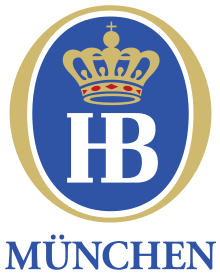Hofbräuhaus
 |
|
| Type | State-owned enterprise |
|---|---|
| Location | Munich, Bavaria, Germany |
| Coordinates | 48°08′36″N 11°41′55″E / 48.1434°N 11.6987°ECoordinates: 48°08′36″N 11°41′55″E / 48.1434°N 11.6987°E |
| Opened | 1589 |
| Annual production volume | 332,841 hectolitres (283,636 US bbl) in 2014 |
| Employees | 125 (2014) |
The Staatliches Hofbräuhaus in München (public Royal Brewery in Munich, also Hofbräu München) is a brewery in Munich, Germany, owned by the Bavarian state government. The Hof (court) comes from the brewery's history as a royal brewery in the Kingdom of Bavaria. The brewery owns the Hofbräuhaus am Platzl, the Hofbräukeller and one of the largest tents at the Oktoberfest (Hofbräu-Festzelt).
There are many types of beer brewed using original recipes handed down by Wilhelm V, the Duke of Bavaria. The current beers produced include a Weißbier and Helles, Maibock, Dunkel and Oktoberfest lagers.
The Hofbräuhaus am Platzl in Munich inspired the song "oans, zwoa, g'suffa" (The Bavarian dialect for: "one, two, down the hatch").
The Hofbräuhaus am Platzl, Munich's famous "hofbrauhaus", was founded in 1589 by the Duke of Bavaria, Wilhelm V. It is one of Munich's oldest beer halls. It was founded as the brewery to the old Royal Residence, which at that time was situated just around the corner from where the beer hall stands today. The beer quickly became quite popular thanks to the first brewer, Heimeran Pongratz, and the famous "Bavarian Beer Purity Law" of 1516 that stated that only natural ingredients could be used in the brewing process.
Maximilian I, Wilhelm's son and heir, did not care much for the popular Braunbier, which was the dark and heavy brown beer. So, in the beginning of the 17th century Maximilian I turned the brewery's focus onto wheat beers and forbade all other private breweries to brew wheat beer, thus creating a monopoly. In 1612, Heimeran Pongraz's successor, Elias Pichler, was under pressure to brew a stronger beer, hence the Maibock. In fact, the Maibock beer became so famous that it once saved the city from annihilation. When King Gustavus Adolphus of Sweden invaded Bavaria during the Thirty Years' War in 1632, he threatened to sack and burn the entire city of Munich. He agreed to leave the city in peace if the citizens surrendered some hostages, and 600,000 barrels of Hofbräuhaus beer.
...
Wikipedia
